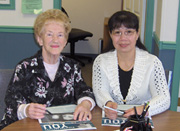Learning Factors 1
There are a number of factors that may affect how adult ESL learners become skilled at the English language. Here are just a few to consider.
Native Language
When tutoring ESL, it's important to remember that most ESL learners you tutor are not learning English to replace their native language, but rather to cope in an English—speaking country. It's also worth noting that learners may already know several other languages—they just haven't learned English yet. For this reason, some people use the term English as an Additional Language (EAL). The native language the learner speaks will affect how they learn English pronunciation, grammar, and vocabulary.
- Pronunciation
Some of your learners' native languages will not have the same sounds as in English. For example, 'v', 'r', and 'th' sounds may not exist in their first language.
- Grammar
English is a complex language with a sentence pattern that may seem strange to some ESL learners.
- Vocabulary
Definitions of words, situations in which they are used, and the social consequences of their use all have to be considered by the learner. Idioms
(e.g. raining cats and dogs, make a killing) are particularly difficult to understand.
As you watch the videos, be sure to jot down details that characterize people as ESL learners.
Some of your learners' native languages will not have the same sounds as in English. For example, 'v', 'r', and 'th' sounds may not exist in their first language.
English is a complex language with a sentence pattern that may seem strange to some ESL learners.
Definitions of words, situations in which they are used, and the social consequences of their use all have to be considered by the learner. Idioms (e.g. raining cats and dogs, make a killing) are particularly difficult to understand.
Pronunciation: Maria
(1:22)
Pronunciation: Peter and Elena
(1:27)
Jenny has been an inspiring member of our ESL group, although for her, it's an EAL group. English will be an additional language to her fluent Cantonese and Mandarin.
 Janette, with Jenny, Kitimat, B.C.
Janette, with Jenny, Kitimat, B.C.

